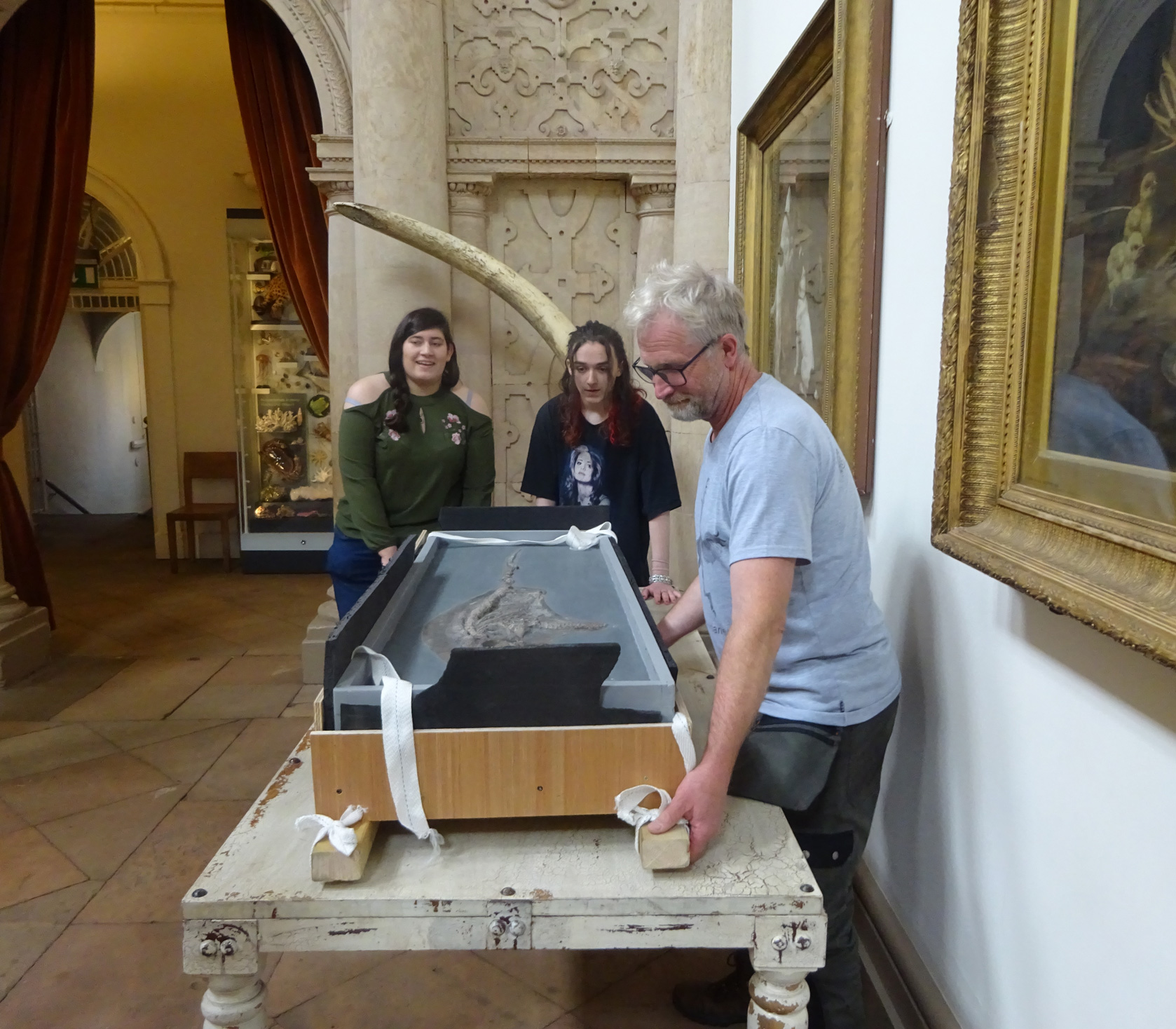Monday, 17 June 2024
A fossil of a newly discovered species of ichthyosaur, which was found in a storeroom at the University of Nottingham, has been donated to Wollaton Hall.
The Protoichthyosaurus, a dolphin-like swimming reptile, was kept in a storeroom at the University for nearly 30 years, until 2017 when it was identified by experts as a new species and was put on display as part of the Dinosaurs of China exhibition in Nottingham. It was the first known fossil of its kind anywhere in the world.
The specimen had previously been used for teaching and outreach work by experts visiting primary schools, before it faded into obscurity and was forgotten about. In 2017, Professor David Large, a geologist and Head of the Department of Chemical and Environmental Engineering at the University, recognised its rareness and retrieved the fossil, enabling palaeontologists and scientists to study the specimen in greater detail.
Dean Lomax*, a palaeontologist and visiting scientist at the University of Manchester, contacted Dr Large in 2014 while searching for another ichthyosaur fossil and was unaware that the newly-found specimen existed as it had not been scientifically examined before. Eventually it was determined as a species new to science. It was hailed as a major step in uncovering Britain’s early fossil past and understanding ichthyosaur evolution.
 The Protoichthyosaurus arriving at Wollaton Hall where it will be part of a new exhibition
The Protoichthyosaurus arriving at Wollaton Hall where it will be part of a new exhibition
Before being put on display, the fossil was checked by a fossil conservation expert, Nigel Larkin, thanks to a generous grant from the Nottingham Cascade Funding Programme. He found that the fossil was complete though the neck region and the front flipper had been repaired.
The Victorian plaster around the neck was chipped away and it was clear that the head belonged to the body and was then repaired for aesthetic reasons. Most of the tail is fake and is constructed in a way that does not conform to how ichthyosaur tails work which dates it to the first half of the 19th century.
The fossil is now on long-term loan to the Nottingham Natural History Museum at Wollaton Hall in Nottingham. It will be moved by the expert palaeontological conservator, Nigel Larkin along with Dr Tom Hartman, keeper of the Zoology Collection in the School of Life Sciences at the University of Nottingham, who has been the caretaker of the fossil for the last few years.
When it is moved to Wollaton Hall it will be on display to the public in a way that is impossible at the University.
The move coincides with a new exhibition being designed at Wollaton Hall so it is the perfect opportunity to relocate the ichthyosaur to a place where it will be safe and not in the way. It is far better that this unique fossil is placed in a museum where it is safe in perpetuity, valued and accessible to both the public and scientific community.
Dr Adam S Smith, Curator of Natural Sciences at Nottingham Natural History Museum at Wollaton Hall, said: “This important Protoichthyosaurus fossil will be a highlight of the new ‘Discovering Dinosaurs’ gallery opening at Wollaton Hall later this summer. It will go on display alongside Titus the T. rex and several other real and replica dinosaur skeletons. We are grateful to the University of Nottingham for letting us put on display for museum visitors from around the world to enjoy.
“Ichthyosaurs are an extinct group of reptiles that lived in the ocean while dinosaurs lived on the land. The had a fish-like tail to propel them through the water, and long jaws full of sharp teeth for catching slippery fish and squid."
Story credits
More information is available from Thomas Hartman on Thomas.Hartman@nottingham.ac.uk
Notes to editors:
About the University of Nottingham
Ranked 97 in the world and 17th in the UK by the QS World University Rankings, the University of Nottingham is a founding member of Russell Group of research-intensive universities. Studying at the University of Nottingham is a life-changing experience, and we pride ourselves on unlocking the potential of our students. We have a pioneering spirit, expressed in the vision of our founder Sir Jesse Boot, which has seen us lead the way in establishing campuses in China and Malaysia - part of a globally connected network of education, research and industrial engagement.
Nottingham was crowned Sports University of the Year by The Times and Sunday Times Good University Guide 2024 – the third time it has been given the honour since 2018 – and by the Daily Mail University Guide 2024.
The university is among the best universities in the UK for the strength of our research, positioned seventh for research power in the UK according to REF 2021. The birthplace of discoveries such as MRI and ibuprofen, our innovations transform lives and tackle global problems such as sustainable food supplies, ending modern slavery, developing greener transport, and reducing reliance on fossil fuels.
The university is a major employer and industry partner - locally and globally - and our graduates are the third most targeted by the UK's top employers, according to The Graduate Market in 2024 report by High Fliers Research.
We lead the Universities for Nottingham initiative, in partnership with Nottingham Trent University, a pioneering collaboration between the city’s two world-class institutions to improve levels of prosperity, opportunity, sustainability, health and wellbeing for residents in the city and region we are proud to call home.
More news…